Unit 7 Sports and Good Health Lesson 40 Move Your Body课件
文档属性
| 名称 | Unit 7 Sports and Good Health Lesson 40 Move Your Body课件 |  | |
| 格式 | zip | ||
| 文件大小 | 1.4MB | ||
| 资源类型 | 教案 | ||
| 版本资源 | 冀教版 | ||
| 科目 | 英语 | ||
| 更新时间 | 2015-12-09 08:32:29 | ||
图片预览

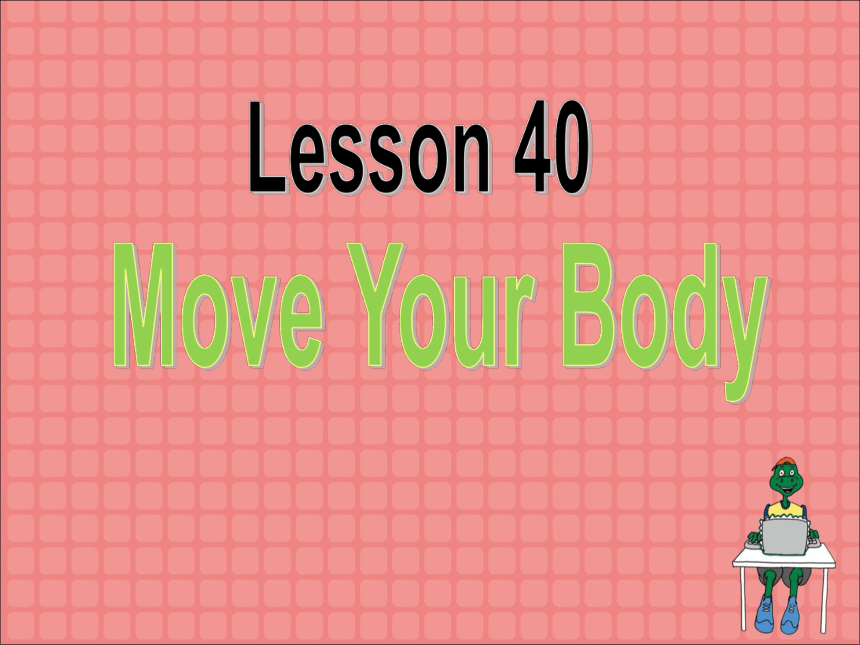
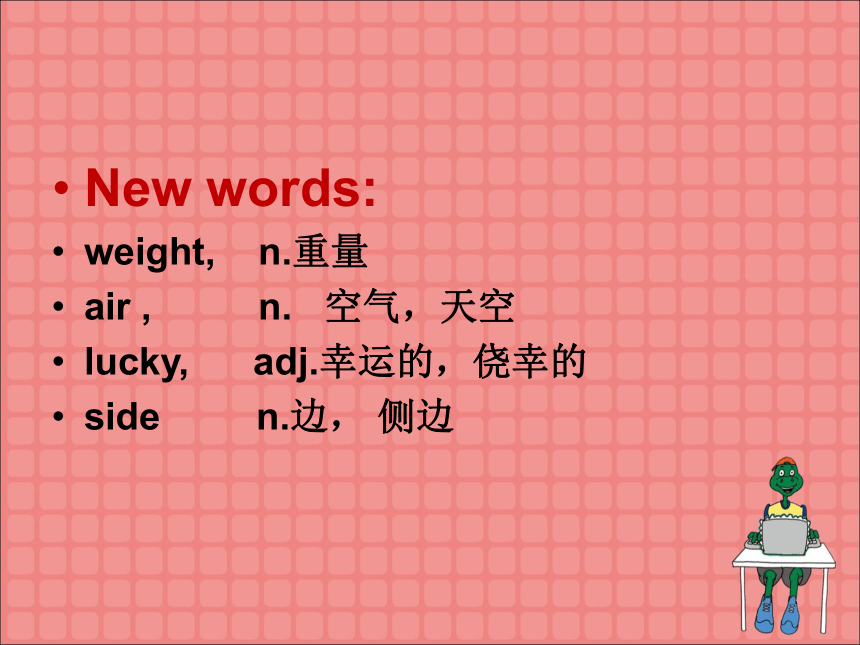
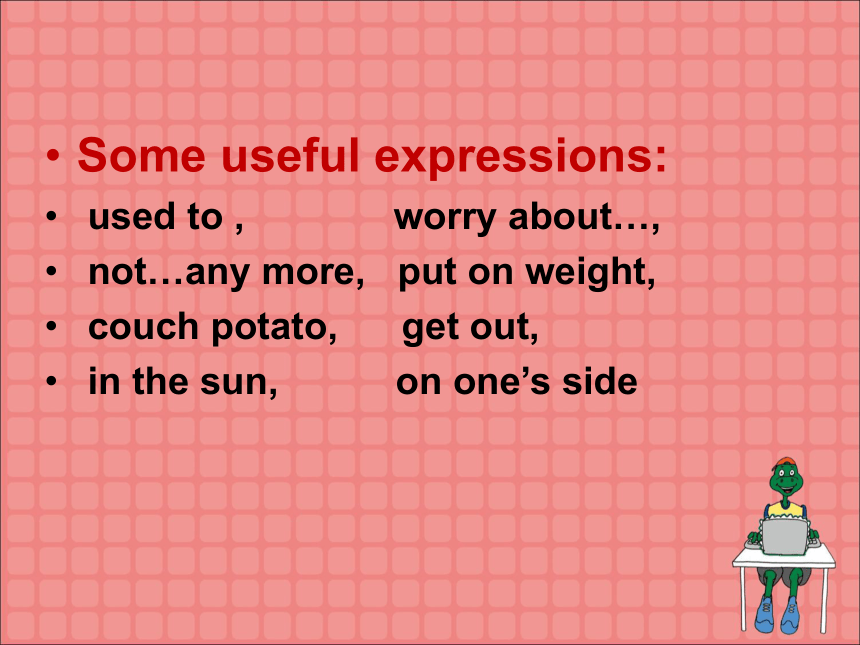
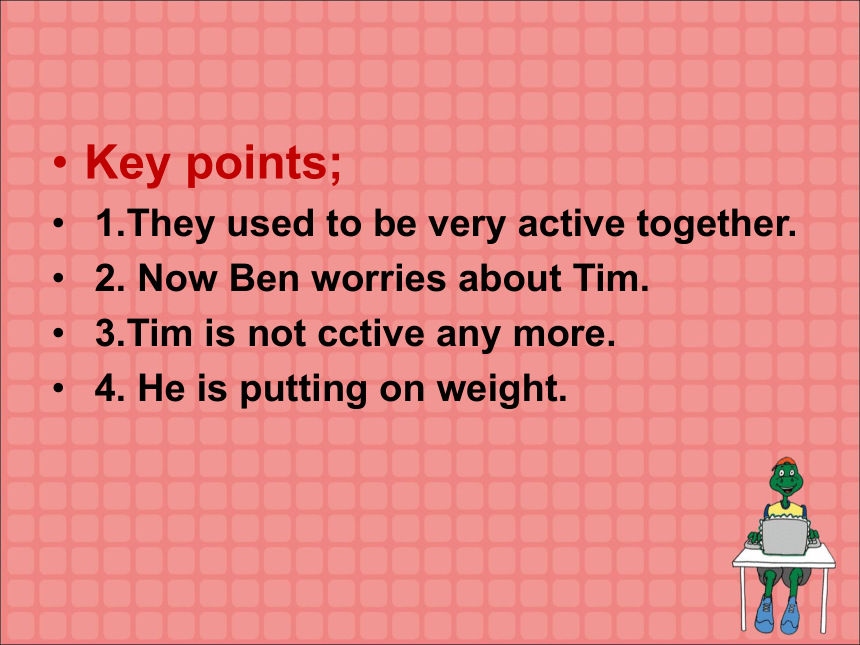

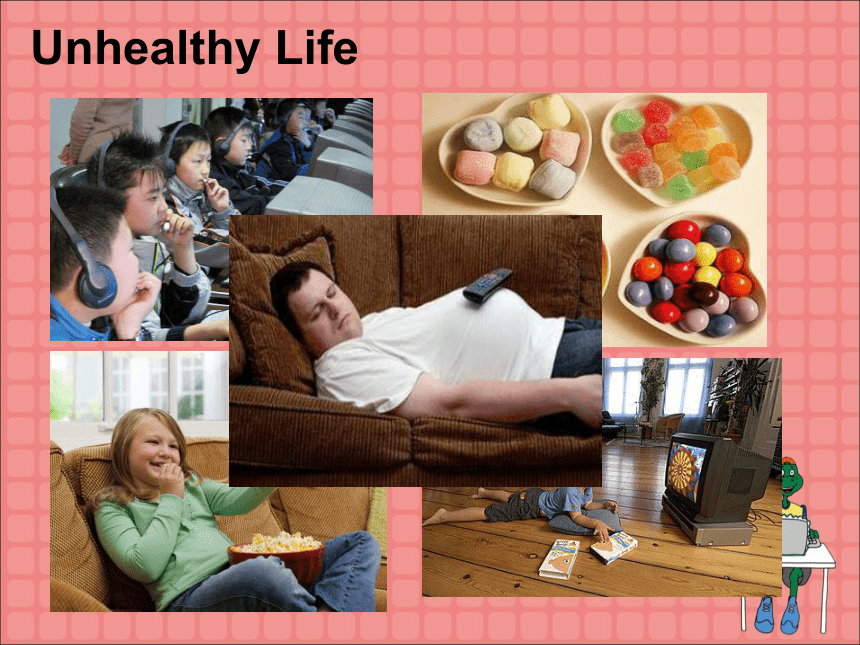
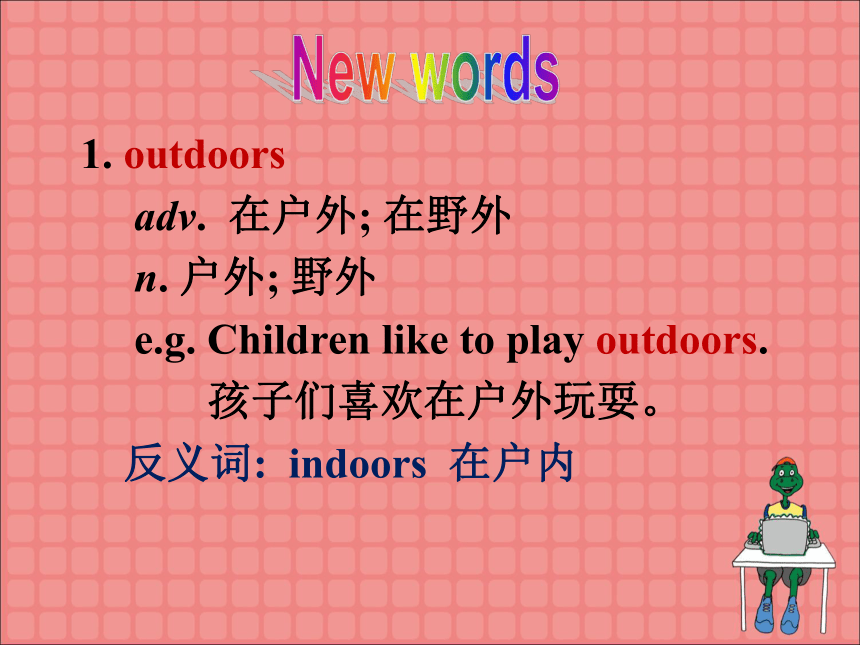
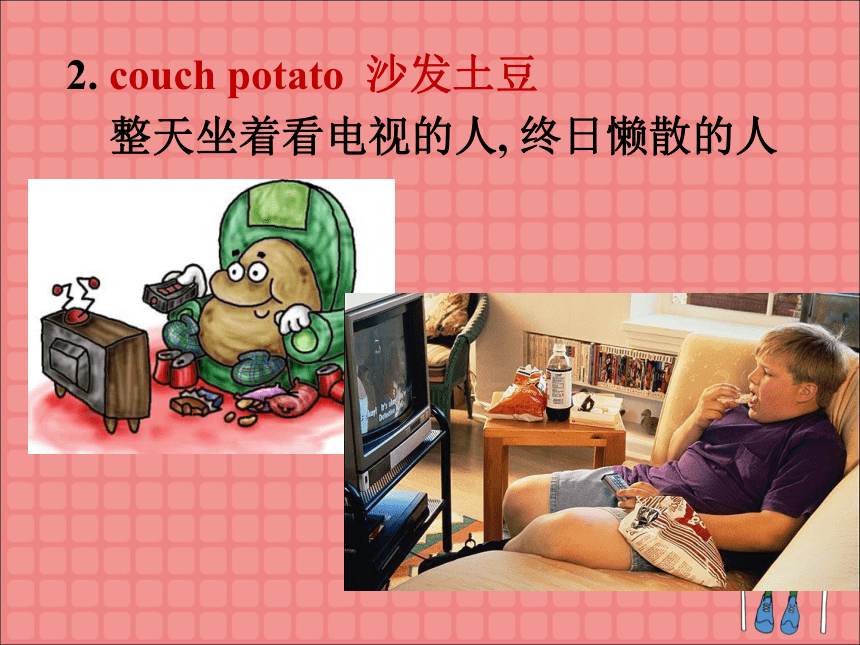
文档简介
课件29张PPT。Unit 7 Sports and Good Health冀教版 七年级下册 Move Your BodyLesson 40
New words:
weight, n.重量
air , n. 空气,天空
lucky, adj.幸运的,侥幸的
side n.边, 侧边Some useful expressions:
used to , worry about…,
not…any more, put on weight,
couch potato, get out,
in the sun, on one’s sideKey points;
1.They used to be very active together.
2. Now Ben worries about Tim.
3.Tim is not cctive any more.
4. He is putting on weight.Healthy LifeUnhealthy LifeNew words1. outdoors
adv. 在户外; 在野外
n. 户外; 野外
e.g. Children like to play outdoors. 孩子们喜欢在户外玩耍。
反义词: indoors 在户内 2. couch potato 沙发土豆
整天坐着看电视的人, 终日懒散的人 3. air n. 空气; 天空
作物质名词泛指“空气”时, 不可数, 不用
冠词;
指某种具体的“气”或“天空”时用冠词。
e.g. Let’s go out and have some fresh
air. 我们出去呼吸点新鲜空气吧。
Many birds are flying in the air. 许多鸟儿在空中飞翔。 Listen to the statements and number the pictures.12345Read the lesson and write true (T) or false (F).1. Tim used to be very active.
2. Ben watches too much TV and plays too many computer games.
3. Ben and Tim are both putting on weight.4. Tim finds a letter at his desk.
5. Ben and Tim will meet and go for a good walk.Why does Ben worry about Tim?
2. What does “couch potato” mean? There are about 800 000 words in the English language.If a person is a couch potato, he is not active and spends most of his time sitting and watching TV. Read and answer the questions.3. Can you find the rhyming words in Tim’s poem?
funny ---- lucky
side ---- wide
o’clock ---- walk1. They used to be very active together.
used to 后接动词原形, 意思是“过去常常”, 表示过去经常发生的动作(或存在的状态)现在已不再发生(或存在)了。
e.g. He?used?to?walk?to?school.
他过去总是步行到校。注: be?used?to
作被动语态讲时, 意为“被用来……”,为动词不定式符号,其后跟动词原形。
e.g. Bamboo?can?be?used?to?carry?water.
竹子可用来输水。
若“be?used?to+名词或v.-ing”, 意思是“习惯于”。
e.g. He?is?used?to?walking?to?school.?
他现在习惯于步行上学了 2. But Ben worried about Tim.
worry about… 担心……
e.g. You don’t have to worry about
that. 你不必为那事操心。3. Tim is not active any more.
not…any more 不再…… , 相当于 no more, 指“数量上或程度上不再增加”, 常与瞬间动词连用。
e.g. She did not see Amy any more.
她没再见过艾米.
注: no longer
no longer相当于not any longer,指“时
间上不再延续”,常与状态动词或延续
性动词连用。
e.g. Annie does not live here any longer.
安妮不住在这儿了。
He is no longer a child.
他不再是一个小孩子了。4. And he is putting on weight.
put on weight 体重增加; 长胖
lose weight 减肥
5. More your body, get out and have fun.
get out 出去
e.g. Should we get out and help?
我们要出去帮忙吗?6. Fresh air, a bike ride, playing in the sun.
in the sun 在阳光下; 在太阳底下
e.g. I sat in the sun all day.
我在太阳下坐了一天。7. With a true friend on my side.
on one’s side
表示支持某人, 站在某人的立场上
by one’s side
表示站在某人的旁边, 表位置关系 Fill in the blanks with the correct forms of the phrases in the box.worry about go for a walk
put on weight used to any moreExercise1. A: How do you go to school, Mike?
B: I ________ walk to school, but now I ride a bike.
2. A: Be careful and don’t stay out too late.
B: Don’t ____________ me, Mum! I will be OK!used toworry about3. A: How is Tom these days?
B: He doesn’t get any exercise and he is not eating healthy food. He is _________________.
4. A: You and Jason are neighbours, right?
B: No. He moved to a new house. He is not my neighbour __________.putting on weightany more5. A: What do you like to do after supper?
B: I like to ____________.go for a walkWork in groups. Good friends are important. They help each other. Did a friend ever help you? Did you ever help a friend? What happened? Talk about it.Good friends should help each other.
I’m not good at math, so he often helps me with my math after class.
He gets on well with us.
…
Useful sentences
New words:
weight, n.重量
air , n. 空气,天空
lucky, adj.幸运的,侥幸的
side n.边, 侧边Some useful expressions:
used to , worry about…,
not…any more, put on weight,
couch potato, get out,
in the sun, on one’s sideKey points;
1.They used to be very active together.
2. Now Ben worries about Tim.
3.Tim is not cctive any more.
4. He is putting on weight.Healthy LifeUnhealthy LifeNew words1. outdoors
adv. 在户外; 在野外
n. 户外; 野外
e.g. Children like to play outdoors. 孩子们喜欢在户外玩耍。
反义词: indoors 在户内 2. couch potato 沙发土豆
整天坐着看电视的人, 终日懒散的人 3. air n. 空气; 天空
作物质名词泛指“空气”时, 不可数, 不用
冠词;
指某种具体的“气”或“天空”时用冠词。
e.g. Let’s go out and have some fresh
air. 我们出去呼吸点新鲜空气吧。
Many birds are flying in the air. 许多鸟儿在空中飞翔。 Listen to the statements and number the pictures.12345Read the lesson and write true (T) or false (F).1. Tim used to be very active.
2. Ben watches too much TV and plays too many computer games.
3. Ben and Tim are both putting on weight.4. Tim finds a letter at his desk.
5. Ben and Tim will meet and go for a good walk.Why does Ben worry about Tim?
2. What does “couch potato” mean? There are about 800 000 words in the English language.If a person is a couch potato, he is not active and spends most of his time sitting and watching TV. Read and answer the questions.3. Can you find the rhyming words in Tim’s poem?
funny ---- lucky
side ---- wide
o’clock ---- walk1. They used to be very active together.
used to 后接动词原形, 意思是“过去常常”, 表示过去经常发生的动作(或存在的状态)现在已不再发生(或存在)了。
e.g. He?used?to?walk?to?school.
他过去总是步行到校。注: be?used?to
作被动语态讲时, 意为“被用来……”,为动词不定式符号,其后跟动词原形。
e.g. Bamboo?can?be?used?to?carry?water.
竹子可用来输水。
若“be?used?to+名词或v.-ing”, 意思是“习惯于”。
e.g. He?is?used?to?walking?to?school.?
他现在习惯于步行上学了 2. But Ben worried about Tim.
worry about… 担心……
e.g. You don’t have to worry about
that. 你不必为那事操心。3. Tim is not active any more.
not…any more 不再…… , 相当于 no more, 指“数量上或程度上不再增加”, 常与瞬间动词连用。
e.g. She did not see Amy any more.
她没再见过艾米.
注: no longer
no longer相当于not any longer,指“时
间上不再延续”,常与状态动词或延续
性动词连用。
e.g. Annie does not live here any longer.
安妮不住在这儿了。
He is no longer a child.
他不再是一个小孩子了。4. And he is putting on weight.
put on weight 体重增加; 长胖
lose weight 减肥
5. More your body, get out and have fun.
get out 出去
e.g. Should we get out and help?
我们要出去帮忙吗?6. Fresh air, a bike ride, playing in the sun.
in the sun 在阳光下; 在太阳底下
e.g. I sat in the sun all day.
我在太阳下坐了一天。7. With a true friend on my side.
on one’s side
表示支持某人, 站在某人的立场上
by one’s side
表示站在某人的旁边, 表位置关系 Fill in the blanks with the correct forms of the phrases in the box.worry about go for a walk
put on weight used to any moreExercise1. A: How do you go to school, Mike?
B: I ________ walk to school, but now I ride a bike.
2. A: Be careful and don’t stay out too late.
B: Don’t ____________ me, Mum! I will be OK!used toworry about3. A: How is Tom these days?
B: He doesn’t get any exercise and he is not eating healthy food. He is _________________.
4. A: You and Jason are neighbours, right?
B: No. He moved to a new house. He is not my neighbour __________.putting on weightany more5. A: What do you like to do after supper?
B: I like to ____________.go for a walkWork in groups. Good friends are important. They help each other. Did a friend ever help you? Did you ever help a friend? What happened? Talk about it.Good friends should help each other.
I’m not good at math, so he often helps me with my math after class.
He gets on well with us.
…
Useful sentences
同课章节目录
- Unit 1 A Trip to the Silk Road
- Lesson 1 A Trip to China
- Lesson 2 Meet You in Beijing
- Lesson 3 A Visit to Xi'an
- Lesson 4 A Visit to Lanzhou
- Lesson 5 Another Stop along the Silk Road
- Lesson 6 Jenny's Diary
- Unit 2 It's Show Time!
- Lesson 7 What's Your Project about?
- Lesson 8 Marco Polo and the Silk Road
- Lesson 9 Danny's School Project
- Lesson 10 Music and Dance
- Lesson 11 Food in China
- Lesson 12 A Blog about the Silk Road
- Unit 3 School Life
- Lesson 13 How Is School Going?
- Lesson 14 Jenny's School Life
- Lesson 15 Making a Difference
- Lesson 16 We Are with You!
- Lesson 17 School Science Fai
- Lesson 18 Teaching in China
- Unit 4 After-School Activities
- Lesson 19 A Dinner Date
- Lesson 20 Join Our Club!
- Lesson 21 What Is Your Club Type?
- Lesson 22 Big Plans for the Weekend
- Lesson 23 A Weekend with Grandma
- Lesson 24 How was Your Weekend?
- Unit 5 I Love Learning English!
- Lesson 25 A Phone Friend
- Lesson 26 Online Phone Calls
- Lesson 27 Amazing English
- Lesson 28 How Do I Learn English?
- Lesson 29 A Door to the World
- Lesson 30 Writing an E-mail in English
- Unit 6 Seasons
- Lesson 31 What Strange Weather!
- Lesson 32 I Can't Wait for Winter!
- Lesson 33 Kim's Favourite Season
- Lesson 34 Steven's Report
- Lesson 35 Surfing in Sydney
- Lesson 36 Spring in China
- Unit 7 Sports and Good Health
- Lesson 37 You Are What You Eat!
- Lesson 38 Stay Healthy!
- Lesson 39 Danny's Report
- Lesson 40 Move Your Body
- Lesson 41 Were People Healthy Then?
- Lesson 42 Know Yourself
- Unit 8 Summer Holiday Is Coming!
- Lesson 43 Have a Good Summer!
- Lesson 44 Volunteering in Summe
- Lesson 45 Baseball Season
- Lesson 46 Get Ready for Summer Holiday!
- Lesson 47 Summer Plans
- Lesson 48 Li Ming's Summer Holiday
